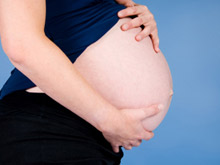Health Topics
-
Healthy Living
-
|
|
October 2009
|
| Obesity in Pregnancy |
| Dr Jayanta Kumar Gupta |
| |
 |
Did you know that being obese during pregnancy could put you and your child at risk for severe pregnancy and health-related complications? Of particular concern for women of childbearing age are the effects that obesity can have on your reproductive health. |
| Not only can obesity put you and your baby at risk for some serious health complications, but it can also actually interfere with fertility. This is because fat
stores change the levels of sex hormones that your body produces, making it increasingly difficult to become pregnant. |
Obesity in Pregnancy
- The term 'obese' actually refers to anyone who is more than 30% over their ideal body weight.
- Pregnancy weight gain may not be necessary for obese women, provided they get sound nutritional advice throughout their pregnancy.
- Nearly one in 10 women of childbearing age is obese, and far more than that are overweight.
- Typically women gradually lose weight over the course of a year or two following a pregnancy.
Complications for Mother
Expectant mothers who are obese are ten times more likely to suffer from minor complications such as headaches, heartburn and chest infections during pregnancy. Obesity during pregnancy runs a high risk of several serious health complications:
- Preeclampsia: This is a condition which causes high blood pressure, fluid retention, and swelling during pregnancy. When serious, preeclampsia can restrict placental blood flow, endangering the baby.
- Gestational Diabetes: Gestational diabetes is a form of diabetes that develops during pregnancy. It prevents your body from breaking down sugar and can put your baby at risk for gaining too much weight in utero.
- Cesarean Section: Women who are obese during pregnancy have an increased risk of experiencing problems during delivery. Labour is more likely to be slow and prolonged, increasing the likelihood of cesarean section.
- Postpartum Infection: Obesity during pregnancy also makes you more vulnerable to experiencing a difficult postpartum recovery. In particular, if you have had a cesarean section, you are at risk for developing serious postpartum infections.
Complications for Baby
The baby is also at risk for developing some dangerous health issues.
- Macrosoma: Macrosoma is a condition in which your baby puts on too much weight during development. This can complicate labour and delivery, making it difficult for your baby to enter and exit the birth canal. Some large babies have their shoulders injured during birth. This is known as shoulder dystonia.
- Neural Tube Defects: Babies born to obese mothers are also at increased risk of suffering dangerous neural tube defects during development. Neural tube defects, like spina bifida and anencephaly, are often associated with low levels of folic acid during the first trimester. These defects can frequently be detected early in pregnancy through the use of ultrasound imaging. However, women who are obese often produce poor ultrasounds. Because the ultrasound waves have trouble penetrating extra layers of fat, blurry images are produced. As a result, neural tube defects aren't always detected in these babies.
- Childhood Obesity: Studies show that babies who are born to obese mothers are more likely to suffer from obesity by the time they reach the age of four.
- Besides these, other birth defects such as cardiovascular defects, hydrocephaly, cleft lip and palate are also associated with babies born to obese mothers.
What Can You Do?
If you are suffering from obesity, there are a few steps that you can take to help reduce the health risks posed to you and your baby:
- Lose Weight Before Pregnancy: If you are planning on getting pregnant, get your weight evaluated by your doctor. If you are obese, consider losing weight through proper diet and exercise. Even minimal weight loss can help to radically reduce your risk of pregnancy complications.
- Watch your Weight Gain: If you are obese, you should never try to lose weight during pregnancy. Weight loss or changes in diet can prevent your baby from getting the calories and nutrients she needs to grow properly. Instead, focus on gaining weight in moderation. Most obese women need to gain between 15 and 25 pounds, putting on the majority of the weight during the third trimester.
- Exercise: Exercise should be continued throughout your pregnancy. Consult your doctor about exercise levels that would be appropriate for you. Even if it's just walking, exercise can really help to reduce your risk of potential health complications.
|
 |
Dr Jayanta Kumar Gupta is Consultant – Obstetrics and Gynaecology at Apollo Hospitals, Kolkata |
|
|
|